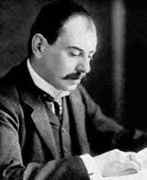Person: Landau, Edmund Georg Hermann

Landau gave the first systematic presentation of analytic number theory and wrote important works on the theory of analytic functions of a single variable.
Mathematical Profile (Excerpt):
- From a young age Edmund showed remarkable talents.
- Landau attended the French Lycée in Berlin, graduating at the age of 16 which is two years earlier than was normal.
- His doctoral work there was supervised by Frobenius, and Landau received his doctorate in 1899 for a thesis on number theory.
- Landau was always interested in mathematical puzzles and even before he received his doctorate he had published two books on mathematical problems in chess.
- Frobenius was somewhat critical of the area that Landau worked in, and remarked at times that Landau's work would cease to become important if the Riemann hypothesis were proved.
- There is little doubt that Frobenius was quite wrong in his assessment of Landau's mathematical talents, but this did not affect Landau's self-confidence in any way.
- Landau taught at the University of Berlin as a privatdozent from 1899 until 1909.
- Landau worked hard to have Schur fill the chair but, against Landau's wishes, Courant was appointed.
- However, despite his outstanding talents as both a teacher and researcher, Landau managed to annoy many of his colleagues at Göttingen with his somewhat arrogant manner.
- After Koebe and Bieberbach had disputed in 1921 the significance of certain results each had published, Landau entered the argument the following year by writing a joint letter to the two of them in which he said that Koebe was the more correct of the two, but still not correct enough.
- Of course usually mathematicians are delighted to see others using their results to push forward, and consider it a compliment if someone publishes a new proof of their results, but it seems to be the arrogant way that Landau did such things that annoyed his colleagues.
- Landau also criticised proofs of theorems published by Blaschke, again saying that the proofs were unnecessarily complicated.
- Despite having friends who were well informed as to what the Nazis might do if they came to power, Landau failed to recognise the danger.
- Before any official work reached Göttingen from the Ministry, the Dean wrote to Landau on 28 April asking him not to give his summer lecture courses and these were given instead by Landau's assistant.
- Having received no further advice from the university authorities, Landau decided to give his autumn lectures as advertised.
- Teichmüller, as leader of the students, had organised the boycott of Landau's lectures.
- Teichmüller went to Landau's office after the boycott and explained that it was not the work of any organised group.
- Landau then asked Teichmüller to put this in writing and he included it with his request to the Ministry that he be retired.
- Landau was given permission on 19 November to work at Groningen, in the Netherlands, and the permission was later extended to allow him to remain there for the winter semester.
- Landau's main work was in analytic number theory and the distribution of primes.
- Landau himself discovered some of the theorems and demonstrated others in a new and simpler fashion.
- Landau wrote over 250 papers on number theory which had a major influence on the development of the subject.
Born 14, Feb 1877, Berlin, Germany. Died 19, Feb 1938, Berlin, Germany.
View full biography at MacTutor
Tags relevant for this person:
Origin Germany, Number Theory, Special Numbers And Numerals
Thank you to the contributors under CC BY-SA 4.0! 

- Github:
-

- non-Github:
- @J-J-O'Connor
- @E-F-Robertson
References
Adapted from other CC BY-SA 4.0 Sources:
- O’Connor, John J; Robertson, Edmund F: MacTutor History of Mathematics Archive
